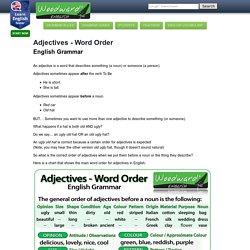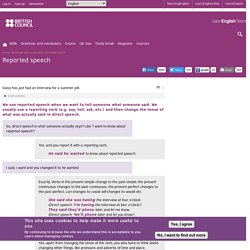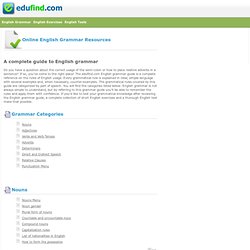

How to express temperature in english.
Tutti i segreti per scrivere la data in inglese - Naboomboo Blog. Road to Grammar - Your Road to Better Grammar. Esl lesson plans, ENGLISH GRAMMAR – Google Drive. Adjectives Word Order. An adjective is a word that describes something (a noun) or someone (a person).

Adjectives sometimes appear after the verb To Be He is short. She is tall. Adjectives sometimes appear before a noun. Red car Old hat BUT… Sometimes you want to use more than one adjective to describe something (or someone). What happens if a hat is both old AND ugly? Do we say… an ugly old hat OR an old ugly hat? An ugly old hat is correct because a certain order for adjectives is expected(Note, you may hear the other version old ugly hat, though it doesn't sound natural) So what is the correct order of adjectives when we put them before a noun or the thing they describe?
Here is a chart that shows the main word order for adjectives in English: IMPORTANT: The order of adjectives before a noun IS NOT FIXED. This chart is only offered as a guide and is the order that is preferred. Let's look at each type of adjective in more detail (with examples)… Types of Adjectives a, an, the, my, your, four, those, some etc. FoxType. Who Has The Most?
Adverbs. Adj/nouns of NATIONALITY. Conditional. Conjunctions. Nouns. PRONOUNS. Relative pronouns. PREPOSITIONS. THE- A/AN ARTICLES. VERBS. Video (grammar) Reported speech. We use reported speech when we want to tell someone what someone said.

We usually use a reporting verb (e.g. say, tell, ask, etc.) and then change the tense of what was actually said in direct speech. So, direct speech is what someone actually says? Like 'I want to know about reported speech'? Yes, and you report it with a reporting verb. He said he wanted to know about reported speech. I said, I want and you changed it to he wanted. Exactly. She said she was having the interview at four o’clock. OK, in that last example, you changed you to me too. Yes, apart from changing the tense of the verb, you also have to think about changing other things, like pronouns and adverbs of time and place. 'We went yesterday.' > She said they had been the day before.
I see, but what if you’re reporting something on the same day, like 'We went yesterday'? Well, then you would leave the time reference as 'yesterday'. 'Dogs can’t eat chocolate.' > She said that dogs can’t eat chocolate. Exactly. OK. Yes. Great. Giving Reasons. Explore the Library. Games and grammar. Dispensa d'Inglese - una grammatica semplificata by Lewis Baker - Home. Dialoghi-grammatica. New Interchange: English for International Communication; Teacher's Edition ... - Jack Croft Richards. English grammar resources. Do you have a question about the correct usage of the semi-colon or how to place relative adverbs in a sentence?

If so, you've come to the right place! The edufind.com English grammar guide is a complete reference on the rules of English usage. Every grammatical rule is explained in clear, simple language with several examples and, when necessary, counter-examples. The grammatical rules covered by this guide are categorized by part of speech. You will find the categories listed below. Comparisons Conditional Future Gerund and Present Participle Infinitive Passive Voice Past Present Functions and classes of determiners Articles Quantifiers Distributives. Interesting Things for ESL/EFL Students (Fun English Study) Download English grammar lessons, for free, in the PDF format. Strunk, William, Jr. 1918. The Elements of Style.
AudioGrammatica Inglese. Instant Grammar Check - Online Proofreading. Ressources pour le Collège - ESL Resources - Label européen des langues. Your Road to Better Grammar. Grammar Practice Activities: A Practical Guide for Teachers. BEG Teacher’s Guide. Grammar Index. Free Online Lessons in English Grammar, Vocabulary and Phrases. Select an exercise below to practise your grammar, vocabulary and use of phrases.

They are organised into three levels: Elementary: suitable for students from levels A2 to B1 on the CEF (Common European Framework) Intermediate: suitable for students from B1 to B2 on the CEF Advanced: suitable for students from C1 and C2 on the CEF The exercises on these pages were all written by International House Bristol staff and you will not find the same exercises on any other site or in any coursebook. Find out more about our General English courses. Guide to Grammar and Writing. Videogrammatica inglese. "The things I used to do"